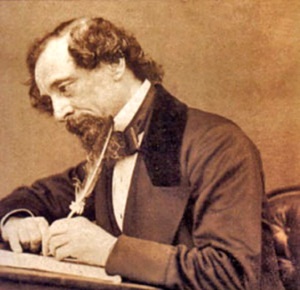Charles Dickens’s works attest to a keen familiarity with the ballads and traditional songs of Ireland and the United Kingdom. Less obvious from his writings is his deep love of Western classical music—he adored the lieder of Mendelssohn-Bartholdy, he championed Arthur Sullivan, and he reported being “overcome” by Gounod’s Faust.
Still, Dickens found a rich vein of humor in the music making of the common folk—not least in the character of Mr. Morfin in Dombey and Son:
“He was a great musical amateur in his way…and had a paternal affection for his violoncello, which was once in every week transported from Islington, his place of abode, to a certain club-room hard by the Bank, where quartettes of the most tormenting and excruciating nature were executed every Wednesday evening by a private party.”
“He was solacing himself with this melodious grumbler one evening, and, having been much dispirited by the proceedings of the day, was scraping consolation out of its deepest notes…[but] his landlady…was fortunately deaf, and had no other consciousness of these performances than a sensation of something rumbling in her bones.”
This according to “Dickens and music” by Charles Cudworth (The musical times CXI/1528 [June 1970] pp. 588–590. Today is Dickens’s 210th birthday!
Related article: Musicology and fiction



